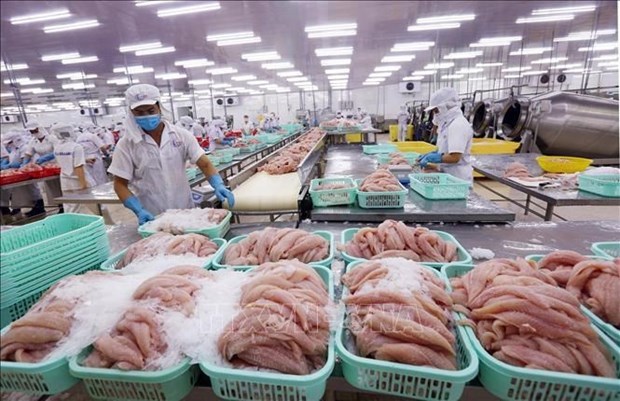
According to Au Anh Tuan, Head of the Customs Supervision and Management Division under the General Department of Vietnam Customs, the customs sector has actively supported and removed difficulties facing exporters amid the complexities posed by the COVID-19 pandemic.
It has targeted reducing costs for administrative procedures and customs clearance time and promoting the application of new technologies in information sharing to facilitate export activities.
According to the General Statistics Office (GSO), Vietnam’s export turnover in the first four months of 2021 recorded the highest growth rate in a decade for the period, rising 28.3 percent year-on-year to 103.9 billion USD.
Experts attributed the result to new generation FTAs that took effect in late 2020.
The EU-Vietnam Free Trade Agreement (EVFTA) and the Regional Comprehensive Economic Partnership (RCEP) are helping Vietnam expand its markets, increase its trade surplus, and enjoy greater benefits from extensive tariff reductions on Vietnamese goods and services exported to other parties to the agreements, they noted.
According to Tran Thanh Hai, Deputy Director of the Agency of Foreign Trade under the Ministry of Industry and Trade (MoIT), businesses must clearly understand how the FTAs can benefit their sector and their products, and adjust their raw material supply and production to meet requirements relating to origin and to enjoy tariff incentives.
Meanwhile, Director of the WTO and Integration Centre under the Vietnam Chamber of Commerce and Industry (VCCI), Nguyen Thi Thu Trang, said relevant ministries and sectors need to continue to assess the impact of each FTA on the business community, especially on each specific group and economic sector.
She emphasised the necessity to increase the dissemination of information on markets and business cooperation opportunities as well as trade promotions and business matching between domestic companies and foreign partners.
Businesses should work to bolster the competitiveness of their products and their management capacity, and be more adaptive and flexible to seize opportunities in production chains to promote business cooperation.
According to Trang, foreign-invested enterprises are often more interested in and knowledgeable about FTAs than local private enterprises.
Many Vietnamese enterprises do not fully understand what is to be gained from tariff regimes and the institutional benefits brought about by FTAs, she said, noting that this not only sees many local businesses miss opportunities but also results in them encountering obstacles when they do wish to take advantage of the opportunities.
MoIT has reported that, from August 1, 2020, when the EVFTA took effect, to April 4 this year, authorised agencies and organisations in Vietnam granted about 127,300 sets of the certificate of origin form EUR 1 for nearly 4.8 billion USD worth of exports to the 27 EU member countries.
Exporters to the EU also conducted self-certification of origin on more than 10.88 million USD worth of goods, to access preferential tariffs.
VNA

Rice exporters urged to utilise FTAs to boost declining shipments
Vietnamese rice exporters have been urged to play a more active role in utilising free trade agreements (FTAs) to which Vietnam is a party to boost falling exports.